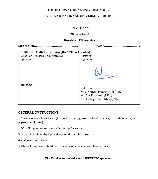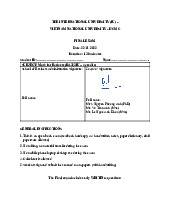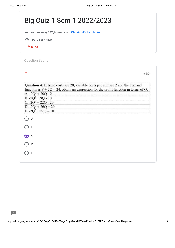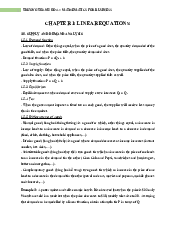









Preview text:
International University School of Business COURSE SYLLABUS 1. General Information - Course Title: + Vietnamese: To#n trong Kinh doanh + English:
MATHEMATICS FOR BUSINESS - Course ID: BAxxx Undergraduate - Course level: Master Both General Fundamental - Course type: Specialization (required) Specialization (elective) Project/Internship/Thesis
Others: ........................... - Number of credits: 4 + Lecture: 4 + Laboratory: 0 - Prerequisites: None - Parallel Courses: None - Course it replaces: - Course standing in curriculum: 2. Course Description
The course will provide students with an understanding of fundamental mathematical
techniques and methods to business context and management decision making. More
specifically, the course will introduce the basic theory and concepts of Calculus, Linear
Algebra and Optimization, with applications to management, economics, finance. Included
topics are Mathematical Functions, Vectors and Matrices, Differentiation and Integration, Linear Programming.
The course is useful for all BA students.
3. Textbooks and Other Required Materials Textbooks:
[1] Ian Jacques, Mathematics for Economics and Business, 8th edition, Prentice Hall, 2015. Reference materials:
[2] Haeussler, Paul, Wood, Introductory Mathematical Analysis for Business, Economics, and
the Life and Social Sciences, 13th Edition, Pearson, 2011.
Additional materials provided in Blackboard
The lecturer will attempt to make lecture notes and additional reading available on
Blackboard. However this is not an automatic entitlement for students doing this subject.
Note that this is not a distance learning course, and you are expected to attend lectures and
take notes. This way, you will get the additional benefit of class interaction and demonstration. 4. Course Objectives
The course aims to provide students with an understanding of fundamental mathematical
techniques and methods to business context and management decision making. The course
will also provide students with the mathematical framework and a scientific approach of
modelling business and economic behavior.
5. Course Learning Outcomes
After successful completion of this course, students should be able to:
L01. Recognise and become familiar with linear equations, nonlinear equations
L02. Recognise and become familiar with mathematics in finance
L03. Understand and master the techniques of differentiation, integration and their relationship.
L04. Understand and become familiar with matrices
L05. Become familiar with linear programming
L06. Understand and recognize the global and local context of business
L07. Know how to work within a team
The alignment between course learning outcomes and program learning outcomes: Program learning % of contribution Group of .......
Course learning outcomes outcomes (*) on PLO LO1, LO2, LO3, LO4, LO5, Knowledge PLO1 3% LO6 Political PLO2 LO6 1% perspective Analytical skills PLO3 LO1, LO2, LO3 2% Communication PLO4 LO7 1% skills Critical thinking PLO5 LO4, L05, LO6 2% skills Technology skills PLO6 LO5 1% Ethical attitude at PLO7 LO7 1% work Cognitive ability and perspectives PLO8 LO7 1% on globalization Teamwork, self- studying, and PLO9 LO7 1% career development skills
Total % contribution of this course to the program learning outcome: 13%
(*) Refer to nine program learning outcomes:
a. Knowledge: The students possess a solid body of knowledge relevant to the areas of
Corporate Finance, Banking and Financial Investment. The program helps students understand
the role of financial markets and financial investment issues of individual and institutional
investors, fundamental theories in financial investment and financial investment operations,
financial management in view of enhancing corporate governance by meeting the legitimate
requirements of a stakeholder perspective and identify the important role of corporate finance in
the international business environment. (PLO1)
b. Political perspective: the students understand fundamentally the structure and principles of
Vietnamese political system and its orientation. (PLO2)
c. Analytical skills: Finishing the program students can manage portfolios of profitability and
risk; make policies, investment planning strategies for businesses as well as investors; analyze
impact of macroeconomic policy (monetary finance) on financial market as well as on financial
investment; set financial plans and provide financial management information for decision making of management. (PLO3)
d. Communication skills: the students demonstrate an ability to communicate effectively by
using appropriate communication methods to both domestic and international audiences. They
are able to communicate effectively in English in all forms of communication such as writing,
presenting, organizing and sharing information. (PLO4)
e. Critical thinking skills: the students understand related issues in multi perspectives, interpret
information effectively, and give sound judgment. (PLO5)
f. Technology skills: the students understand how to apply effectively and efficiently
appropriate technologies to business and communication settings. (PLO6)
g. Ethical attitude at work: the students develop an awareness of the ethical dimensions of
communication, behavior, and decision-making at the workplace. (PLO7)
h. Cognitive ability and perspectives on globalization: the students are sensitive to
opportunities and challenges of globalization; responsive to cross-cultural issues that influence
business operations in the global context so as to take advantages of global opportunities and overcome challenges. (PLO8)
i. Teamwork, self-studying, and career development skills: the students are effective team
members who are able to and willing to support others, to become successful team leaders, to
pursue life-long study having future-oriented perspectives. They learn and respect the abilities
and contributions of colleagues, and willing to take responsibility for their behavior and actions. (PLO9) 6. Course Assessment 6.1 Grading Assessment component Assessment form Percentage % A1. Process assessment A1.2 Quiz, Assignment 30% A2. Midterm assessment A2.1 Mid-term Examination 30% A3. Final assessment A3.2 Final examination 40% 6.2 Assessment Plan Level of Bloom taxanomy Applying Analyzing Evaluating Creating Weigh No. Assessment tasks Learning Outcome MCQ MC (%) (**) WQ P MCQ WQ P WQ P MCQ WQ P Q Recognise and become familiar A1 1 with linear x x x x x x 10 A2 equations, nonlinear equations (LO1) Recognise and A1 become familiar 2 x x x x x x 20 A2 with mathematics in finance (LO2) Level of Bloom taxanomy Applying Analyzing Evaluating Creating Weigh No. Assessment tasks MCQ MC (%) Learning Outcome (**) WQ P MCQ WQ P WQ P MCQ WQ P Q Understand and master the A1 techniques of 3 A2 differentiation, x x x x x x 20 A3 integration and their relationship. (LO3) Understand and A1 4 become familiar x x x x x x x x 20 A3 with matrices (LO4) Become familiar A1 with linear 5 x x x x x x x x 10 A3 programming (LO5) Understand and A1 recognize the global 6 x x x x x x 10 A3 and local context of business (LO6) Know how to work 7 A1 x x 10 within a team (LO7) Total 100
(**) MCQ: Multiple choice questions ; WQ: Writing questions; P: Presentation Attendance
Students are required to be regular and punctual attendance at lectures and seminars during this course. Quiz, Assignment
The quiz and assignment will be conducted through multiple choice question form and
writing questions to test students’ understanding and knowledge. Midterm exam
The midterm exam will be conducted through multiple choice questions and writing questions. Final exam
The final exam will be conducted through multiple choice questions and writing questions. 7. Course Outline Learnin Teaching and Week/ g Content learning Assessment Class outcome activities s [1] Chapters 1-2 A1 L01 1-2
Linear and Non-linear Equations A2 [1] Chapter 3 3-4-5 Mathematics of Finance L02 A1 L06 A2 L07 [1] Chapter 4 6-7-8 Differentiation L03 A1
Application of differentiation L06 A2 Review L07 9-10 Partial differentiation L03 [1] Chapter 5
Unconstrained optimization L06 A1
Constrained optimization L07 A2 Lagrange Multipliers L04 [1] Chapter 7 A1 11-12 Matrix L06 A3 L07 L05 [1] Chapter 8 A1 13 Linear Programming L06 A3 L07 L03 [1] Chapter 6 14 Integration A1 L06 Application A3 L07 15 Review 8. Course policies 8.1 Workload
It is expected that the students will spend at least eight hours per week studying this
course. This time should be made up of reading, research, working on exercises and
problems, and attending classes. In periods where they need to complete assignments or
prepare for examinations, the workload may be greater.
Over-commitment has been a cause of failure for many students. They should take the
required workload into account when planning how to balance study with part-time jobs and other activities. 8.2 Attendance
Regular and punctual attendance at lectures is expected in this course. University
regulations indicate that if students attend less than eighty per cent of scheduled classes, they
may not be considered for final assessment. Exemptions may only be made on medical
grounds. It means that if you miss more than two classes, you may fail the class. 8.3
General Conduct and Behavior
Beepers, cell phones, and pagers need to be turned off before entering the classroom.
The students are expected to conduct themselves with consideration and respect for the needs
of the fellow students and teaching staff. Conduct which unduly disrupts or interferes with a
class, such as ringing or talking on mobile phones, is not acceptable and students will be
asked to leave the class. More information on student conduct is available at the university webpage. 8.4 Keeping informed
The students should take note of all announcements made in lectures or on the
course’s Blackboard. From time to time, the university will send important announcements to
their university e-mail addresses without providing a paper copy. The students will be
deemed to have received this information 8.5
Academic honesty and plagiarism
Plagiarism is the presentation of the thoughts or work of another as one’s own
(definition proposed by the University of Newcastle). Students are also reminded that careful
time management is an important part of study and one of the identified causes of plagiarism
is poor time management. Students should allow sufficient time for research, drafting, and
the proper referencing of sources in preparing all assessment items. The university regards
plagiarism as a form of academic misconduct, and has very strict rules regarding plagiarism.
9. Course Coordinator / Lecturer -
School / Department: School of Business -
Course Coordinator / Lecturer: Le Ngoc Anh Khoa -
Email: lnakhoa@hcmiu.edu.vn Phone: 0939456447
Ho Chi Minh City, 06 August 2022 HEAD OF DEPARTMENT DEAN OF SCHOOL OF BUSINESS




